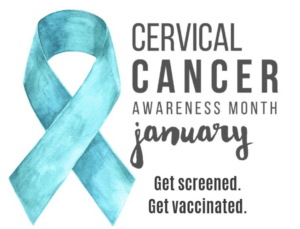January is Cervical Cancer Awareness Month

Although cervical cancer is one of the most preventable and treatable types of cancer, it has a heavy impact on women, with 90% of cases and deaths occurring in low- and middle-income countries around the world. In 2020, in fact, about 604,000 women were diagnosed with cervical cancer, and 342,000 died from the disease. To encourage increased education cervical health and cervical cancer prevention – and take steps to help eliminate this preventable cancer – Cervical Cancer Awareness Month in January is an important opportunity to share evidence-based information, promote vaccination against human papillomavirus (HPV) and screening, and emphasize the World Health Organization (WHO) Global Cervical Cancer Elimination Initiative.
To eliminate cervical cancer, experts say that countries worldwide must reach and maintain an incidence rate of below 4 per 100,000 women, which rests on three key pillars and their corresponding targets:
- Vaccination: 90% of girls fully vaccinated with the HPV vaccine by the age of 15;
- Screening: 70% of women screened using a high-performance test by the age of 35, and again by the age of 45;
- Treatment: 90% of women with pre-cancer treated and 90% of women with invasive cancer managed.
Women’s health is – not surprisingly – a major focus of our curricula, with full-day sessions dedicated to topics including cancer prevention and screening, pelvic health, women’s advocacy, sexual function, and menopause. CME focused on women’s health will be available at all of our 2024 CME conferences.
We also provide an On-Demand course on Women’s Health, which walks participants through topics ranging from contraception, LGBTQIA+, sexual health, dermatologic disorders, pain disorders, infections, menstruation and menopause, women’s health guidelines, STIs, and PCOS. The package is worth 13 CME Credit Hours and 4.25 Pharmacology credits.